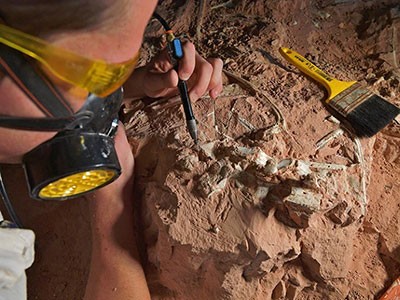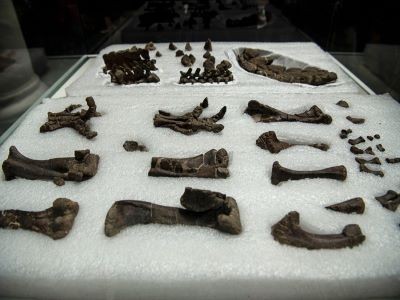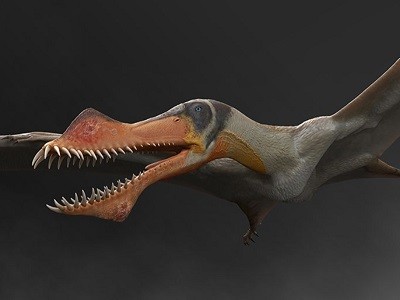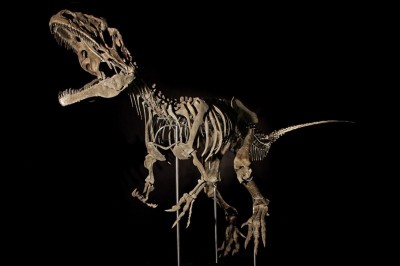
Palaeontologists seeking to publish in high-profile journals might disregard ethical and legal issues to source fossils.Credit: Nikolay Doychinov/AFP/Getty
The pressure to publish in high-impact journals is leading to unethical and possibly even illegal practices that threaten the integrity of palaeontological research, two early-career researchers argue in a forthright analysis.
In the article, published in a special ethics edition of The Geological Curator1, Nussaïbah Raja-Schoob and Emma Dunne point out that high-impact journals tend to focus on novelty — discoveries of charismatic or unusual specimens, especially those related to dinosaurs or preserved in amber. In the race to publish, they say, this emphasis might lead researchers to disregard other important considerations such as ethical and legal issues surrounding fossil provenance.
The pair looked at publication trends in palaeontology across five decades and at news and social-media coverage of palaeontology studies published in high-profile journals between 2015 and 2020. They argue that a publication bias towards research into exceptional, newsworthy fossils over classic taxonomic and systematic work “can not only encourage authors to commit various transgressions, but is also a major obstacle to addressing gaps in the literature”.
How a Brazilian dinosaur sparked a movement to decolonize fossil science
Raja-Schoob and Dunne draw a distinction between palaeontology-specific journals, which typically have a Journal Impact Factor (JIF) of less than 5, and more generalist, high-profile journals such as Nature and Science, which have JIFs in excess of 60. These prestigious journals publish a tiny proportion of all palaeontology papers, the authors’ analysis shows, but such papers score highly when researchers’ work is assessed by hiring managers, peers or grant committees.
“Knowing how we are evaluated for funding or jobs, you basically have to publish in these high-tier journals,” says Raja-Schoob, a palaeobiologist at Friedrich-Alexander University of Erlangen–Nuremberg (FAU) in Germany. “So there’s more incentive maybe [for palaeontologists] to find these incredible fossils.”
Illegal goods
Some countries, including Brazil, Mexico and Myanmar, prohibit the trade or permanent export of fossils without permission, and Brazil specifies that foreign researchers must also collaborate with local scientists. Dunne and Raja-Schoob argue that some palaeontologists seeking to publish in eminent journals might go so far as to disregard research ethics and ignore local laws to source fossils that have never been seen before.
They detail cases from the past few years in which local palaeontologists have claimed that fossils were illegally exported or purchased in murky circumstances, including a now-retracted study of a Brazilian dinosaur named ‘Ubirajara jubatus’ and a ray-like shark from Mexico, Aquilolamna milarcae. In July, German authorities announced that the ‘Ubirajara’ sample would be returned to Brazil after their investigation failed to find legitimate export permits or any clear documentation of its acquisition.
How rich countries skew the fossil record
Such alleged ethical transgressions are rooted in colonialism and stretch back decades, according to an analysis published earlier this year2. It’s mainly this colonial legacy that leads some foreign researchers to disregard or dismiss the laws of ‘supplier’ countries that provide specimens, says Juan Carlos Cisneros, who is a co-author of the analysis, along with Raja-Schoob, Dunne and their colleagues. But he also suspects the pressure on researchers to publish is making the situation worse. “It’s not new, but it’s probably happening more nowadays because of this pressure to publish,” says Cisneros, a palaeontologist at the Federal University of Piauí in Teresina, Brazil.
Dunne, a palaeobiologist at the FAU, suspects that the practice of sourcing fossils by unethical or even unlawful means could be more pervasive than people realize. If other disciplines used unethical practices, such as unlawfully collecting patient samples for cancer research, “there would be an outcry”, she says. But in palaeontology, “it’s swept under the rug for the ‘sake of science’.”
Specimen scoop
Palaeobiologist Diego Garcia-Bellido at the University of Adelaide in Australia says the fear of being scooped by another group might encourage overstretched palaeontologists to rush a paper through to publication rather than wait to find additional specimens that would give them a more comprehensive picture of the fossil record. “The pressure is on both editorial teams and researchers,” he says.
To make matters worse, palaeontology findings tend not to be superseded as quickly as discoveries in other experimental sciences, because of the time it takes to find and collect new fossils. In some instances, says Garcia-Bellido, it can take years to set the record straight with new material.
Legal loopholes also contribute to the problem, Raja-Schoob and Dunne argue. For instance, amber can be legally exported from Myanmar as a gemstone and people are allowed to take rocks out of Mexico.
Brazil wins legal fight over 100-million-year-old fossil bounty
Another example they refer to is a March 2020 Nature paper that first described a species dubbed Oculudentavis khaungraae as a bird-like dinosaur, on the basis of a tiny skull trapped in Myanmar amber. The paper was retracted four months later after the fossil’s classification came under scrutiny, and the species has since been described by other researchers as a “bizarre lizard, not a bird”3. Although the retraction was not the result of any apparent fraud, the fossil thrust widely reported controversies around Myanmar amber “further into the spotlight” and “heightened debates about how such ethical, societal and human rights issues should be handled in palaeontological research,” Raja-Schoob and Dunne write1.
Palaeontology is likely to suffer the consequences of the quest for novelty in years to come, Dunne says. Fundamental taxonomic work to classify species is dwindling as early-career palaeontologists choose instead to focus their studies on fossil sites that are more likely to yield specimens suited to top-tier publications.
“With the current structure of how we reward great science — or what we think is great science — we’re creating a monoculture of palaeontology researchers”, which will eventually undermine palaeontological studies as a whole, Dunne says.
Local involvement
Cisneros says editors should invite local researchers to review papers detailing specimens or samples sourced from that person’s country. This would improve research practices and prevent ‘parachute’ science — whereby researchers travel to extract data or materials from a field site, often in the global south, and leave without collaborating with local scientists. He also thinks journals shouldn’t accept submissions that don’t include a local researcher, even if the law allows it. Otherwise, he says, such fly-in researchers are “benefiting from the heritage of that country without giving anything back”.
Carnivorous-dinosaur auction reflects rise in private fossil sales
Journals also need to enforce their policies, Cisneros says. Some specialist journals state that manuscripts describing fossil material of uncertain or dubious origin will not be accepted for publication. In May 2020, not long before the Nature retraction, the Journal of Systematic Palaeontology announced that it will no longer publish papers based on specimens preserved in Myanmar amber because of humanitarian concerns. However, not all palaeontologists agree with this outright ban. Other publications, such as the Journal of Vertebrate Paleontology, have instead opted to vet each submission using strict guidelines.
In June 2021, policies for Nature Portfolio journals covering palaeontology, archaeology and geology were updated to mandate that all samples must be collected and exported in accordance with local and national laws. Researchers are now required to declare their compliance with these policies in two checklists before peer review, and to provide details of fossil provenance as well as permits for specimen collection and, where applicable, lawful export. (Nature Portfolio is part of Springer Nature, which publishes Nature and Nature Index. Nature Index is editorially independent of its publisher.)
In a statement, a spokesperson for Nature Portfolio journals wrote: “We can and do reject papers if they do not meet any of our editorial policy requirements — including in cases where our editors and expert reviewers consider that the authors have not provided sufficient evidence that fossil collection was done in a responsible manner and in accordance with relevant permits and local laws.”
Data from a September analysis by Dunne and Raja-Schoob4 suggest that progress to curb unethical practices is slow. Since June 2020, only 2 out of 222 published papers describing fossils entombed in Myanmar amber have detailed how their specimens were legally and ethically acquired.
Dunne says most journals lack the infrastructure and legal backing to deal with complaints about fossil provenance and to investigate instances of possible illegal conduct, leaving questionable cases unresolved. “This is a structural problem,” she says. “There is no net to catch this systemically.”

 How a Brazilian dinosaur sparked a movement to decolonize fossil science
How a Brazilian dinosaur sparked a movement to decolonize fossil science
 How rich countries skew the fossil record
How rich countries skew the fossil record
 Brazil wins legal fight over 100-million-year-old fossil bounty
Brazil wins legal fight over 100-million-year-old fossil bounty
 Carnivorous-dinosaur auction reflects rise in private fossil sales
Carnivorous-dinosaur auction reflects rise in private fossil sales





